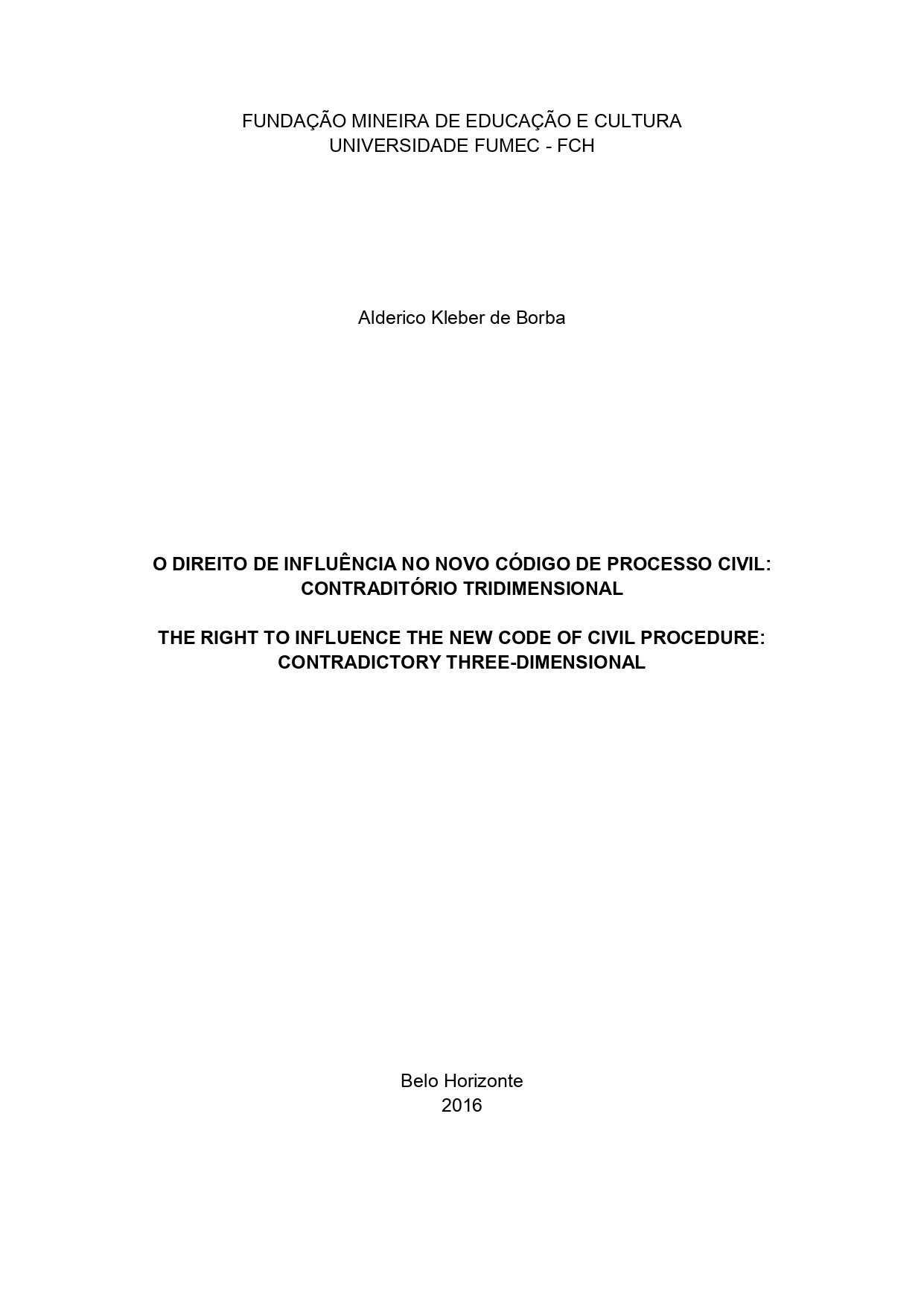O direito de influência no novo código de processo civil: contraditório tridimensional

Visualizar/
Data
2017Autor
Borba, Alderico Kleber de
xmlui.mirage2.itemSummaryView.MetaData
Mostrar registro completoResumo
Objetiva-se analisar as disposições do Novo Código de Processo Civil-NCPC
acerca do contraditório e da fundamentação das decisões. Utilizou-se vertente
metodológica jurídico-teórica, baseando-se no estudo de normas e doutrinas. O
referencial teórico é a obra Processo Constitucional e Estado Democrático de
Direito, de Ronaldo Brêtas. No desenvolvimento, analisaram-se as ondas
renovatórias do processo, os fundamentos e os elementos do Estado
Democrático de Direito-EDD. Na sequência, investigou-se o surgimento do
processo constitucional e sua positivação no NCPC. Ao final, a pesquisa
analisa a superação das concepções clássicas de jurisdição, que não são
modelos construídos para o processo no EDD. Com as novas disposições
trazidas pelo NCPC, a aplicação do contraditório dá-se em sua visão
tridimensional conhecimento-reação-influência. Direito de influência que está
permeado por todo Código, tanto na parte geral quanto na parte especial. Além
disso, o NCPC fixou parâmetros para nortear a atividade judicial,
estabelecendo um núcleo mínimo de conteúdo quando da prolação de
decisões judiciais, positivando a fundamentação analítica, consonante o devido
processo constitucional, uma vez que concretiza o direito de às partes
influenciarem a decisão. Referida fundamentação, além de inibir decisões
arbitrárias, coaduna com o princípio da eficiência, aprimorando e qualificando o
direito fundamental da motivação dos atos judiciais, já consagrado no texto
constitucional, em seu art. 93, IX. Essas mudanças tornam o processo mais
democrático. Desta forma, é possível afirmar que o NCPC apresenta-se como
uma importante ferramenta na implementação do EDD. The goal is to analyse the provisions of the new code of Civil procedure-NCPC
about contradictory and justification of decisions. Using legal-theoretical
methodological aspects, based on the study of rules and doctrines. The
theoretical framework is the constitutional process and democratic State of law,
Ronaldo Brêtas. The development waves analyzed renewal process, the
essentials and the elements of the democratic State of law-EDD. Following to
investigate the emergence of constitutional process and its recognition at the
NCPC. In the end, the research analyzes the overcoming of the classical
concepts of jurisdiction, which are not models built for the process in the EDD.
With the new provisions brought by the NCPC, the application of contradictory
in its three-dimensional view knowledge-reaction-influence. Right to influence
that is permeated by all code, both in the general part and special part. In
addition, the NCPC has set parameters to guide the judicial activity, setting a
minimum core content when the delivery of judgments, positivando the
analytical reasoning, in line with the due constitutional process, as it applies the
right of parties to influence the decision. Referred to state reasons, in addition to
inhibiting arbitrary decisions, in line with the principle of efficiency, enhancing
and improving the basic right of the motivation of judicial acts, already
enshrined in the constitutional text, in his art. 93, IX. These changes make the
process more democratic. In this way, it is possible to affirm that the NCPC
presents itself as an important tool in the implementation of the EDD.
